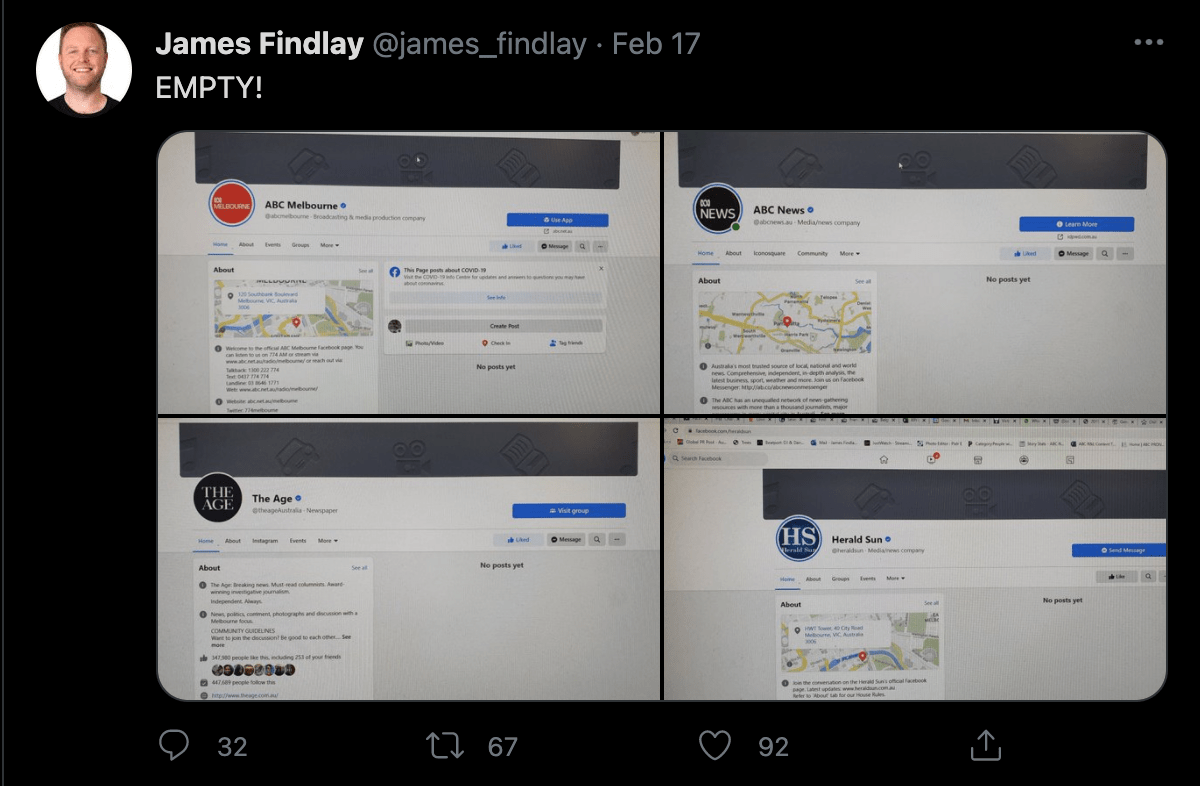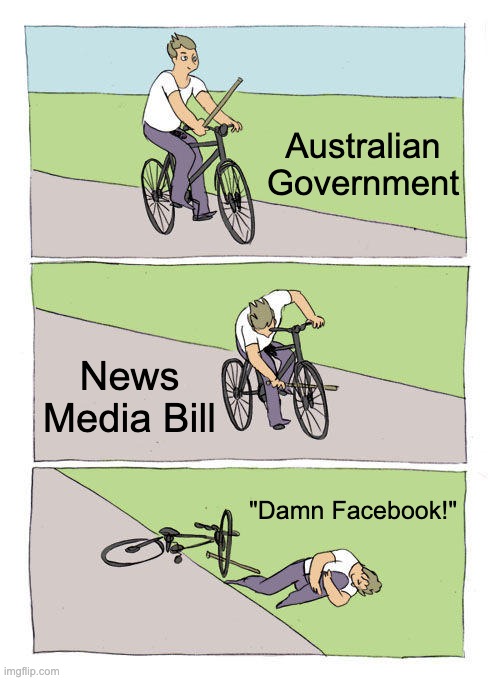Australia’s Dumb News Media Bill Backfires

By Shaun Tan
Founder, Editor-in-Chief, and Staff Writer
20/2/2021

Yesterday, people in Australia woke up to find they could no longer post news stories on Facebook, nor view news stories there. This might have come as a shock to many people, but it was the utterly predictable outcome of the Australian government’s harebrained scheme to prop up the country’s struggling news industry.
No doubt Canberra’s intentions were good. Australia’s news industry, like the news industry pretty much everywhere else in the world, is struggling to survive. Like many of their counterparts in other countries, Australia’s news organizations are heavily reliant on advertising to make ends meet, but have seen their advertising revenue dwindle in the past few decades, as most ad money now goes to tech giants like Facebook and Google. The Australian government’s solution to this problem, however, is to introduce a law forcing Facebook and Google to effectively subsidize local news organizations by paying to display links to news stories on their pages. This means Facebook would have to pay local news organizations for allowing people in Australia to share and see links to their news stories on its site, and Google would have to pay local news organizations if people in Australia see links to their stories in their search results. This has to be one of the worst ideas I’ve ever heard. It is so manifestly stupid and unjust that it was doomed to fail from the start.
The Australian government seems to be trying to justify this bill by claiming that Facebook and Google are displaying news from news outlets without paying for it. This is absolute nonsense. As everyone knows, links to news stories on Facebook and Google only display headlines and abstracts (or brief extracts), and these are meant to entice people to click on them and visit the news sites themselves, helping to increase their traffic.
The sad truth is that the news industry has been hopelessly outcompeted by Big Tech. It’s not hard to see why. Why pay to advertise something in a news outlet when you can pay to advertise it on Google or social media instead, which have enough data on their users to enable you to micro-target your ads to them based on their specific demographics, habits, and interests? (Hell, I run a news outlet and I myself prefer to market it on social media because it seems to give us more bang for our buck.) It brings me no pleasure to say this, but Big Tech is simply way more attractive to advertisers than we are. Asking Facebook and Google to subsidize the news industry because it has outcompeted it for ad revenue is like asking Coca-Cola to subsidize Pepsi, and every other soda company out there, because it’s more popular than they are.
Asking Facebook and Google to subsidize the news industry because it has outcompeted it for ad revenue is like asking Coca-Cola to subsidize Pepsi because it’s more popular.
Unsurprisingly, Facebook and Google have balked at this, and, rather than pay for allowing people in Australia to share and see links to news stories on its site, Facebook has made it so people in Australia can no longer do so, which it has every right to do, and which is exactly what it warned the Australian government it would do if Canberra went ahead with its ridiculous news media bill over five months ago.

How news outlets’ Facebook pages appear in Australia now
Who’s suffered the most from the Australian government’s mismanagement of this issue? News outlets themselves – and Australian news outlets in particular – the very stakeholders the news media bill was supposed to be helping. News outlets benefitted immensely from being able to share their news stories on Facebook with people in Australia, and from those people being able to share those stories with others on Facebook; now, this avenue is closed to them.

As Rabbit Hole’s founder and editor-in-chief, I, more than most, know and sympathize with the plight of the news industry. Making a news publication sustainable is damn hard. There are few professions that are as thankless, insecure, and financially unrewarding as journalism, and, at the same time, there are few professions that are as vital to a free society. The news industry is struggling, but this isn’t the fault of Facebook and Google. It’s because we valued our product so little that for so many years we gave it away for free online, and over-relied on advertising to cover our costs. It’s because we’ve allowed people to grow so accustomed to being able to consume news for free that few are now willing to pay even a modest price for it. (Every time I hear an entitled reader whine about how they “only” get to read three articles on Rabbit Hole a month without subscribing, or that whilst doing so they have to go through the extraordinary effort of closing a popup, I want to throttle him.)
It’s good that the Australian government seems to see the value of the news industry, but if it truly values it so much, it should put its money where its mouth is and subsidize it itself, the same way it subsidizes other public goods like art galleries and museums and science centers and state broadcasters like ABC and SBS, instead of expecting foreign private companies to do so. Australia’s prime minister, Scott Morrison, should turn aside from this folly and shelve the news media bill instead of engaging in a pissing contest with Mark Zuckerberg, a pissing contest he forced Zuck into and which he initiated for no good reason.
If the Australian government truly values the news industry so much, it should put its money where its mouth is and subsidize it itself.
In the meantime, Australians’ Facebook feeds will now be almost exclusively filled with photos and vapid status updates, and since links to stories from real news outlets are now barred from the site, what little news they’re still able to see on it will be even more prone to misinformation. The Australian public will suffer as a result – and they have their own government to blame. The Australian news industry, which is hurting the most from this, and which lobbied for this ill-conceived bill in the first place, only has itself to blame.
